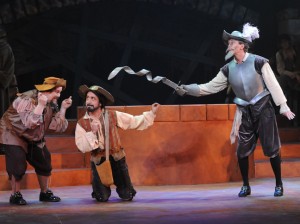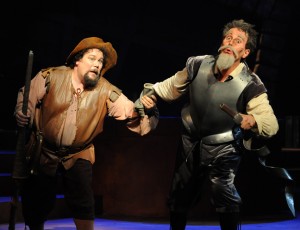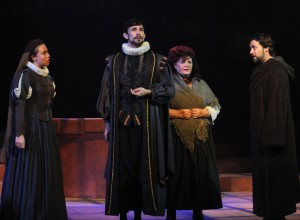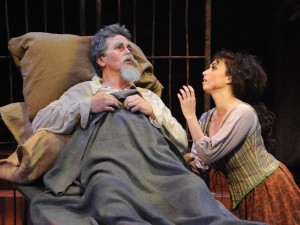TO STAGE AN IMPOSSIBLE DREAM
Now in its 60th season, Musical Theatre West (MTW) is currently reviving Man of La Mancha with the astronomical performance of Davis Gaines as its driving force. Technically, the estimable company has never been better, producing sights and sounds the likes of which one would only expect from a Broadway show. The cast contains some of the best and brightest stars of the American Musical Theater who are well-cast and vocalize beyond expectation. On these points of distinction alone, a hardy recommendation is respectfully submitted. However, under Nick DeGruccio’s grandiloquent direction, the technical superiority and stellar cast trump the pace, nuance and plausibility necessary for this war-horse to be truly inspirational.
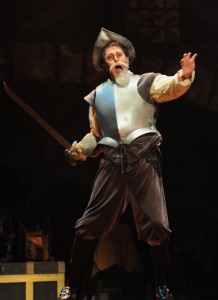 Mr. Gaines, best known as having played the title role in Phantom of the Opera over 2,000 times, is simply one of the best musical leading actors in America. There were more than a few moments in his turn as Cervantes (and alter-ego Don Quixote) that called to mind the indelible Richard Kiley, who originated the role and played it on Broadway for many of the 2,328 performances from 1965 to 1971. With no hint of mimicry of the original dreamer of impossible dreams, Mr. Gaines can now safely share the perch with Mr. Kiley as a definitive Quixote, commanding the stage with the authority of a great actor, the incorruptibility of the character he portrays, and a resounding, opulent and powerful voice. His stirring rendition of “The Quest” (aka “The Impossible Dream”) created the spiritual gooseflesh only found in the theatre when a great singer is perfectly matched to a great song.
Mr. Gaines, best known as having played the title role in Phantom of the Opera over 2,000 times, is simply one of the best musical leading actors in America. There were more than a few moments in his turn as Cervantes (and alter-ego Don Quixote) that called to mind the indelible Richard Kiley, who originated the role and played it on Broadway for many of the 2,328 performances from 1965 to 1971. With no hint of mimicry of the original dreamer of impossible dreams, Mr. Gaines can now safely share the perch with Mr. Kiley as a definitive Quixote, commanding the stage with the authority of a great actor, the incorruptibility of the character he portrays, and a resounding, opulent and powerful voice. His stirring rendition of “The Quest” (aka “The Impossible Dream”) created the spiritual gooseflesh only found in the theatre when a great singer is perfectly matched to a great song.
Why, then, with such rousing elements and stirring moments, does MTW’s production fail to be touching and moving? It may be that Mr. DeGruccio is daunted by the elusive dichotomy of the book and score, both of which teeter between musical comedy, operetta and a serious play. In revival after failed revival – including Broadway productions with Raul Julia (1992) and Brian Stokes Mitchell (2002) – many a director has had trouble finding the right tone for La Mancha. Even the “original star” revival of 1977 found critics less forgiving of the overly-sentimental construction of the show, which tenuously attempts to merge realism with romanticism. (Believe it or not, reviewers were even harsher about the music and lyrics, which, for me, remain as attractive as the stylish guitar-woodwind-brass orchestrations that accompany them).
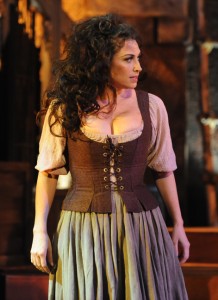 The real-life Cervantes satirized the Romantic Literature of his day, but he also created a work that perfectly encapsulated the duality of man’s absurdism and that of his unquenchable spirit. It is the latter, along with some truly great material, that had audiences throng to La Mancha when first it opened. There is an innocence and modesty in the proceedings that allow discerning patrons to overlook an entertainment in which, according to Walter Kerr, irony is sacrificed to sentiment and savage satire to sweetness. No doubt the piece works, but many a revival flounders because of the awkward book; it is simply too difficult for a director to keep all of La Mancha’s plates spinning at the end of their sticks (which is exactly what killed the screen adaptation with Peter O’Toole).
The real-life Cervantes satirized the Romantic Literature of his day, but he also created a work that perfectly encapsulated the duality of man’s absurdism and that of his unquenchable spirit. It is the latter, along with some truly great material, that had audiences throng to La Mancha when first it opened. There is an innocence and modesty in the proceedings that allow discerning patrons to overlook an entertainment in which, according to Walter Kerr, irony is sacrificed to sentiment and savage satire to sweetness. No doubt the piece works, but many a revival flounders because of the awkward book; it is simply too difficult for a director to keep all of La Mancha’s plates spinning at the end of their sticks (which is exactly what killed the screen adaptation with Peter O’Toole).
When La Mancha first hit the scene, the notion of “tilting at windmills” was invaluable to an audience which was still reeling from the death of JFK and the ideals he embodied. While American ideals are still in question today, the death of the economy is not the proper zeitgeist to make the show resonate. Neither is a proficient crew. The behemoth goings on at the Carpenter Performing Arts Center, as tremendously admirable as they are, actually detract from the heart of the show, that indomitable spirit which can be traced to the show’s origins.
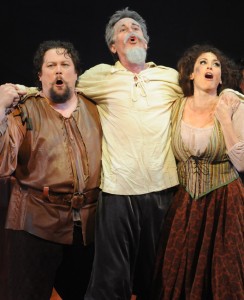 Man of La Mancha “A New Musical Play” was a musical of many firsts. Librettist Dale Wasserman had never written a musical (his only stab at Broadway, a flop, was the fairly inadequate adaptation of One Flew Over the Cuckoo’s Nest (1963) starring Kirk Douglas). Composer Mitch Leigh was a jingle writer (“Nobody Doesn’t Like Sara Lee”) who also had never composed for the theatre. Lyricist Joe Darion, who replaced first-timer W.H. Auden (yes, the poet, whose lyrics were deemed “overtly satiric and biting”), had only one previous attempt at a major musical: Shinbone Alley (1957), a flop about cockroach Archy and alley cat Mehitabel, co-written with Mel Brooks.
Man of La Mancha “A New Musical Play” was a musical of many firsts. Librettist Dale Wasserman had never written a musical (his only stab at Broadway, a flop, was the fairly inadequate adaptation of One Flew Over the Cuckoo’s Nest (1963) starring Kirk Douglas). Composer Mitch Leigh was a jingle writer (“Nobody Doesn’t Like Sara Lee”) who also had never composed for the theatre. Lyricist Joe Darion, who replaced first-timer W.H. Auden (yes, the poet, whose lyrics were deemed “overtly satiric and biting”), had only one previous attempt at a major musical: Shinbone Alley (1957), a flop about cockroach Archy and alley cat Mehitabel, co-written with Mel Brooks.
All former efforts by producer Albert Selden had also failed, both as a producer and composer, but the wealthy man (with family money earned at Chase National Bank and American Express) was the guiding spirit behind the restoration of the landmark Goodspeed Opera House in East Haddam, Conn., which reopened in 1963 with Mr. Selden as its managing director. Two seasons after sundry revivals, Selden brought on Albert Marre (the prolific director of such hits as Kismet, The Chalk Garden and Milk and Honey) to create the 1965 summer season, which was supposed to be a triad of original musicals all in rep and written by the previously mentioned untried scribes. It was Marre who approached Wasserman with the idea of musicalizing Wasserman’s own 1959 teleplay I, Don Quixote (it was also Marre’s wife, Joan Diener, who assumed the role of Quixote’s lady Dulcinea).
Wasserman’s brilliant idea was not to adapt Don Quixote literally, but instead be an original work that merges the strong and affectionate spirit of Miguel de Cervantes, of whom very little is known, with that of his imaginary creation. In the play, Cervantes awaits trial for an offense against the Church. The prisoners who share the dungeon create a kangaroo court and confiscate his possessions, including the now famous manuscript, because he is guilty of being “an idealist, a bad poet, and an honest man.” To gain leniency, the writer presents an entertainment, his tale of the errant knight, with the help of his fellow inmates, a mélange of cutthroats and thieves.
In a preface to the play, Wasserman notes that La Mancha must seem hopelessly naïve in its espousal of illusion as man’s strongest spiritual need, the most meaningful function of his imagination. It is this naïveté that gives the show its strength and which also makes it so difficult to stage. There’s plenty of mugging and growling in DeGruccio’s well-staged presentation, but very little true humor or drama. Exquisite stage pictures and rock-em, sock-em performers are one thing, but too many distractions – such as the oddly tentative fight sequences – keep the soul of the musical at bay.
The original production relied on the audience’s imagination, using a unique dalliance of props and lighting to set the stage a la Story Theatre. At MTW, Kevin Clowes’ eye-popping set includes a gigantic spiral staircase on an anachronistic turntable, and an unsuitably sluggish torture hanging-cage which is used as a medieval elevator to drop off and pick up prisoners (an incongruous device since hooded executioners use the wings for entrances and exits as well). Because of the extraneous mechanics, we don’t buy that we are in a dungeon below the torture chambers of the infamous Spanish Inquisition in 1594. Hopefully, MTG can salvage this set for their first production of Les Miz.
Steven Young’s lighting design is sheer artistry and one of the best seen in years, including the windmill effects and purple and magenta backlights for the nooks and crannies of the dungeon, not unlike Pirates of the Caribbean at Disneyland (a major compliment from this Disneyphile). Julie Ferrin is in top form with the sound design, especially the echoes that bounce off the dungeon walls, rattling chains, and dripping water. Cathleen Edward’s costumes are truly amazing, but the skimpy outfits on the muleteers made them seem like Chippendale’s Dancers. (Now, put the overly-buff muleteers in that slow-moving torture cage and we’ve got another show completely.)
Just as with his 1776 at MTW, DeGruccio never fails to shine in his collection of supreme talent, but some actors needed a bit more guidance in regards to character shading. The hamming of Jason Webb as the Padre and the Sergio Leone western-flavored Sam Zeller as the muleteer Pedro, for example, could be befuddling. These performances represent the lack of much-needed nuance and seriousness, another reason that this opulent and satisfactory La Mancha did not reach an apotheosis.
Musically, the entire evening is sheer perfection. Matthew Smedal runs a tight ship with his musical direction (although it’s a shame that the thrilling overture was cut). In “I’m Only Thinking of Him,” the golden-throated Webb, the dulcet-toned Karenssa Legear as the madman’s niece Antonia, and Dynell Leigh, the Housekeeper with a strong character vibrato, all match up perfectly. Also outstanding are Richard Gould as the Innkeeper, the always reliable Damon Kirsche as Dr. Carrasco and Steven Glaudini as the Barber. Justin Robertson is fine as the sidekick Sancho Panza, and perfectly corpulent for his role, but he gives us little in the comedy department.
The near-perfect cast is led by Lesli Margherita, who alternates perfectly between the wretched kitchen wench Aldonza and the graceful Dulcinea, the lady of Quixote’s heart. Madam Margherita can seductively snarl in one song and be wistfully tender in another. “Aldonza,” her tale that begins with her birth in a ditch, is a highlight (just as her “I Hate Men” in Reprise’s Kiss Me, Kate was the acme of that show).
MTW’s production is quite spectacular indeed and deserves praise for its superior artistry and setting the stage for Mr. Gaines’ remarkable performance. Spectacular but not stunning. A perfect revival of Man of La Mancha may just be an impossible dream.
photos by Ken Jacques
Man of La Mancha
Musical Theatre West
Carpenter Performing Arts Center in Long Beach
ends on February 26, 2012
for tickets, visit MTW

